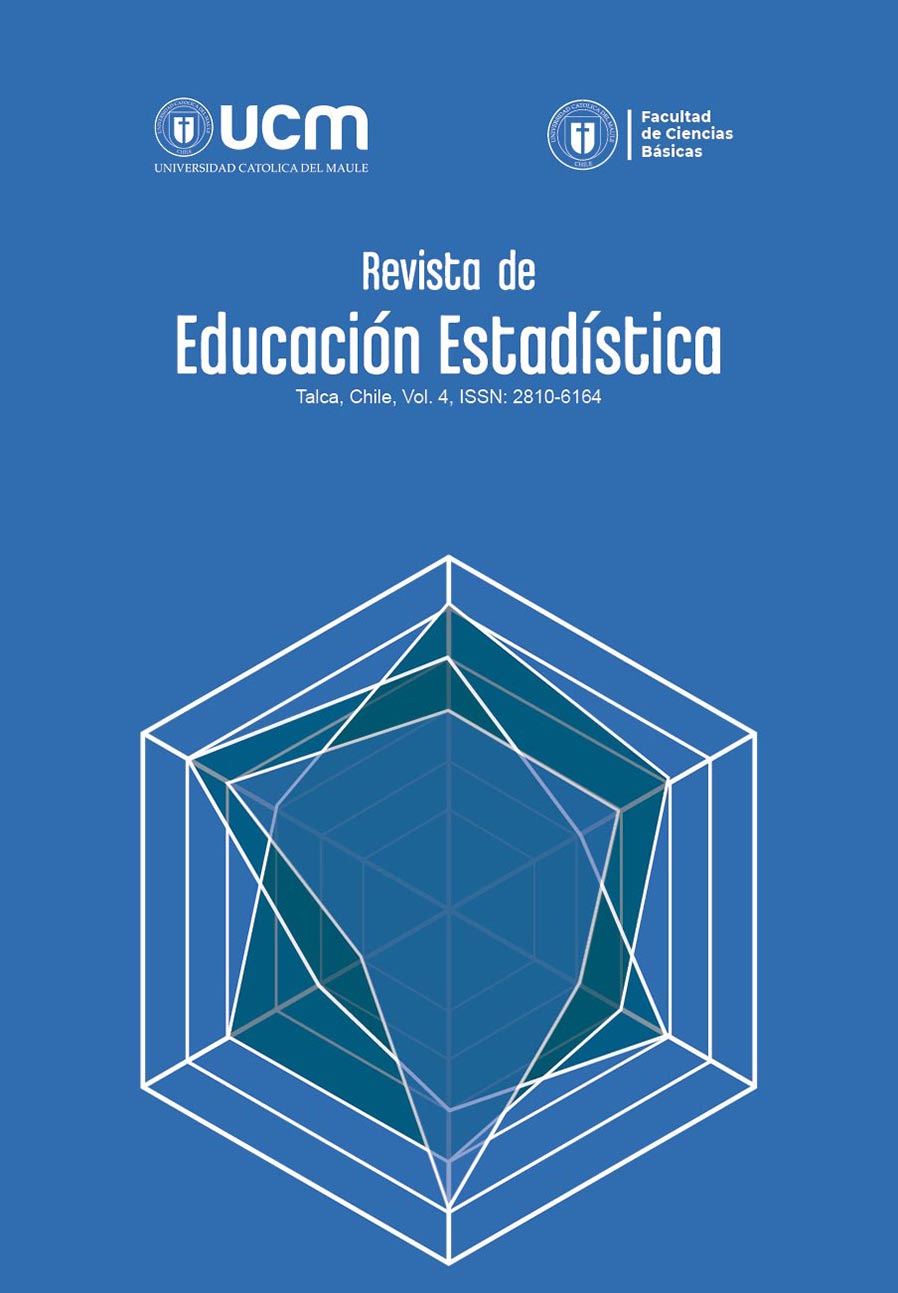Desenvolvimento de sentido estatístico para posicionamento crítico
Conteúdo do artigo principal
Resumo
Detalhes do artigo
Alcañiz Roy, G., Escrivà, A. y Mayoral, O. (2021). Percepciones, ideas alternativas y sesgos sobre el cambio climático en el futuro profesorado. En D.R. Cano, R. Mancinas Chávez y R. Fernández-Reyes, (Eds.), Comunicación del cambio climático: Una herramienta ante el gran desafío (pp. 297-318). Dykinson.
Arellano-García, Y. y Gamboa-Mateus, E. (2024). La investigación sobre el conocimiento estocástico de profesores de matemáticas: 2018-2023. Revista de Educación Estadística, 3, 1-16. https://doi.org/10.29035/redes.3.1.6
Batanero, C., Díaz, C., Contreras, J.M. y Roa, R. (2013). El sentido estadístico y su desarrollo. Revista Números, 83, 7-18.
Campos, C.R. (2016). La educación estadística y la educación crítica. En I. Álvarez y C. Sua (Eds.), Memorias del II Encuentro Colombiano de Educación Estocástica (pp. 5-23). Asociación Colombiana de Educación Estocástica.
Conway, K.E. (2017, 22 de enero). Sean Spicer gave “alternative facts” [Entrevista en Meet the Press]. NBC News.
delMas, R. (2002). Statistical Literacy, Reasoning, and Learning: A Commentary. Journal of Statistics Education, 10(3), 1-11. https://doi.org/10.1080/10691898.2002.11910679
Davies, B. y Harré, R. (1990). Positioning: The discursive production of selves. Journal for the Theory of Social Behaviour, 20(1), 43-63. https://doi.org/10.1111/j.1468-5914.1990.tb00174.x
Denzin, N.K. y Lincoln, Y.S. (2017). The SAGE handbook of Qualitative Research. Sage.
Gal, I., Nicholson, J. y Ridgway, J. (2022). A Conceptual Framework for Civic Statistics and Its Educational Applications. En J. Ridgway (Ed.), Statistics for Empowerment and SocialEngagement. Teaching Civic Statistics to Develop Informed Citizens (pp. 37-66). Springer Nature. https://doi.org/10.1007/978-3-031-20748-8_3
Gamboa-Arraya, R. (2011). El papel de la teoría crítica en la investigación educativa y cualitativa. Revista Electrónica Diálogos Educativos, 11(21), 53-70.
Gee, J.P. (2014). An introduction to discourse analysis: Theory and method (4th ed.). Routledge.
Gould, R. (2021). Toward data-scientific thinking. Teaching Statistics, 43, S11-S22. https://doi.org/10.1111/test.12267
Franco, J., Alsina, Á. y Vásquez, C. (2024). Teaching Statistics for Sustainability across Contexts: Exploring the Knowledge and Beliefs of Teachers. Sustainability, 16(2), 692. https://doi.org/10.3390/su16020692
Konold, C., Higgins, T., Russell, S. y Khalil, K. (2015). Data seen through different lenses. Educational Studies in Mathematics, 88(3), 305-325. https://doi.org/10.1007/s10649-013-9529-8
Krippendorff, K. (2013). Content analysis: An introduction to its methodology (3rd ed.). SAGE Publications.
Lawson, T. (2022). Social positioning theory. Cambridge Journal of Economics, 46(1), 1-39. https://doi.org/10.1093/cje/beab040
León, B. y Erviti, M.C. (2021). La comunicación del cambio climático en redes sociales: Fortalezas y debilidades. En D. Rodrigo-Cano, R. Mancinas-Chávez y Rogelio Fernández-Reyes (Eds.), Comunicación del cambio climático: Una herramienta ante el gran desafío (pp. 208-223). Dykinson.
Maldita.Es. (2023). Las desinformaciones del video que niega el calentamiento global y su relación con el CO2 y asegura que las temperaturas no han subido desde 1998. Maldito Bulo, https://maldita.es/malditobulo/20230712/video-ferrandis-cambio-climatico-co2/
Martínez-Castro, C., Zapata-Cardona, L. y Jones, G. (2023). Critical citizenship in statistics teacher education. En G.F. Burrill, L. de Oliveria Souza y E. Reston (Eds.), Research on Reasoning with Data and Statistical Thinking: International Perspectives. Advances in Mathematics Education (pp. 213-226). Springer. https://doi.org/10.1007/978-3-031-29459-4_17
NASA (2022). Open Data Portal. https://data.nasa.gov/dataset/Nenana-Ice-Classic-Tanana-River-Ice-Annual-Breakup/s57v-zszn/about_data
Organización de las Naciones Unidas [ONU]. (2015). Transforming our world: The 2023 agenda for sustainable development. ONU.
Powell, A.B., Francisco, J.M. y Maher, C.A. (2003). An analytical model for studying the development of learners’ mathematical ideas and reasoning using videotape data. The Journal of Mathematical Behavior, 22(4), 405-435. https://doi.org/10.1016/j.jmathb.2003.09.002
Pfannkuch, M. y Wild, C. (2000). Statistical thinking and statistical practice: themes gleaned from professional statisticians. Statistical Science, 15(2), 132-152. https://doi.org/10.1214/ss/1009212754
Sagarin, R. y Micheli, F. (2001). Climate change in nontraditional data sets. Science, New Series, 294(5543), 811. https://doi.org/10.1126/science.1064218
Vásquez, C. y Alsina, Á. (2022). Retos contemporáneos en la formación del profesorado: desarrollando competencias de sostenibilidad desde la educación estadística. Revista Científica Ecociencia, 9(4), 111-132.
Wild, C. y Pfannkuch, M. (1999). Statistical thinking in empirical enquiry. International Statistical Review, 67(3), 223-248. https://doi.org/10.1111/j.1751-5823.1999.tb00442.x
Wilkinson, L. (2005). The grammar of graphics (2nd ed.). Springer. https://doi.org/10.1007/0-387-28695-0Zapata-Cardona, L. (2016). Enseñanza de la estadística desde una perspectiva crítica. Revista Yupana, 10, 30-41.
Zapata-Cardona, L. (2025). Public engagement of underserved students with open civic data. ZDM Mathematics Education, 57, 19-30. https://doi.org/10.1007/s11858-024-01641-4
Zapata-Cardona, L., Escobar-Franco, D.M., Santa-Ramírez, Z., García Barco, L. y Riascos Forero, Y. (2022). Promoting critical citizenship in professional development of mathematics teachers via statistical investigations. En S.A. Peters, L. Zapata-Cardona, F. Bonafini y A. Fan (Eds.), Bridging the Gap: Empowering & Educating Today’s Learners in Statistics. Proceedings of the 11th International Conference on Teaching Statistics (ICOTS11 2022) (pp. 1-6). IASE

Este obra está bajo una licencia de Creative Commons Reconocimiento-NoComercial-CompartirIgual 4.0 Internacional.


